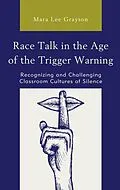To generate opportunities for transformative learning, educators must create learning environments that help students feel safe and encourage them to grapple with potentially difficult material. The trigger warning, a brief statement information students of potential distressing or re-traumatizing content, has been offered as a way to do just that, but this practice is neither as effective nor as equitable as it may seem. Intentionally or indirectly, the trigger warning limits the extent to which students are encouraged to engage in transformative critical conversations and reinforces the culture of silence that prevails in many educational spaces.
Emerging as a response to trauma amid an educational environment that professes student-responsiveness and celebrates diversity yet perpetuates the marginalization of many of the bodies in the classroom, the trigger warning is not the problem - but it is not the solution either.
What does this mean for the faculty members teaching this new generation of college students? And the teachers who find this generation's younger siblings in their high school classrooms?
Drawing upon original research, Mara Lee Grayson tracks the rise of the trigger warning within historical and contemporary educational contexts; explores its potentialities, limitations, and abuses as praxis; and offers curricular suggestions for high school and college instructors seeking to implement equitable, antiracist pedagogies that simultaneously encourage students' well-being, provoke intellectual and emotional growth, and challenge the cultures of silence that maintain inequity on school campuses.
Autorentext
Mara Lee Grayson is the author of Teaching Racial Literacy: Reflective Practices for Critical Writing, Race Talk in the Age of the Trigger Warning: Recognizing and Challenging Classroom Cultures of Silence, and Antisemitism and the White Supremacist Imaginary: Conflations and Contradictions in Composition and Rhetoric. She works as an associate professor of English at California State University, Dominguez Hills. Judith Chriqui Benchimol is a college composition and English education lecturer with Sephardic Jewish roots. She holds a Masters degree in Life Writing from University of East Anglia and is presently a Ph.D. candidate and nonfiction writing lecturer at Teachers College, Columbia University.
Inhalt
Acknowledgments
Introduction: Trigger Warning as Apologia
Chapter 1: Racism, Antiracism, and Education: Classroom Spaces as Microcosms
Chapter 2: The Rise of the Trigger Warning
Chapter 3: Speaking Truth to Trauma: Schooling and Suffering in the United States
Chapter 4: Academic Discourse and the Inequity of the Politeness Protocol
Chapter 5: Coping in the Classroom: Emotions and Education
Chapter 6: Reading Lives, Writing Lives: Languaging and Counternarrating Trauma
Chapter 7: Career Considerations: Managing Challenges to Emotional Health and Academic Freedom
Bibliography
Index
About the Author
